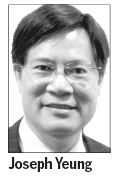By-election furore good occasion for self-analysis
Updated: 2011-07-16 06:58
By Joseph C.K. Yeung(HK Edition)
|
|||||||
The once high-pitched political debate over the replacement mechanism to fill Legislative Council vacancies has temporarily calmed down following the government's decision to postpone the vote on the mechanism it proposed and launch a consultation exercise.
Although they have been accused by the pan-oppositionists as a stalling tactic, this step by the government is indeed wise. Given the impulsive style characteristic of Hong Kong's social movements and the fact that complicated issues are often solved over a longer time frame, it avoids a situation whereby the pro-establishment parties are cornered by the opposition and lose the forthcoming District Council election.
As a matter of fact, the majority of citizens do support the government's attempt to plug the loophole in the existing laws that may be utilized by opposition legislators to launch "de facto referendums" through "trick" resignations. However, what they are dissatisfied with is the absence of any public consultation on the proposal.

The pan-opposition took advantage of the fact that the citizens generally don't have a good understanding of the technical particularities of the proposal and diverted their attentions to such appealing claims as "the absence of public consultation is in violation of procedural justice" and "the vacancy replacement mechanism is an act of stripping the citizens of their by-election vote". They ingeniously brought a question into the citizens' minds: "How come they attempt to deprive me of my voting right even without asking me first about it?", and by this way they easily won many citizens to their side.
The above sentiment is deep-rooted in Hong Kong citizens, who are of the firm conviction that "whatever result comes from due procedure is a just result". The reason why the debate over the replacement mechanism has transformed from the mechanism itself to whether a public consultation session should be in order is the government's neglect of procedural justice.
The late American philosopher and Harvard University professor John Rawls argued in his seminal A Theory of Justice (1971) that by the term "justice" he meant a purely procedural justice. As an illustration, he gave an example of how to divide a cake equally among a group of people, and he proposed a procedure for ensuring equal division of the cake. The person who divides the cake should be the last one to choose his own portion. In this procedure, the person cutting the cake has to divide the cake equally to ensure that he will get the largest portion possible.
In the present case of the government's bill on the replacement vacancy mechanism, the original plan by which the draft was scheduled, without public consultation, for second reading and voting on July was equal to having the government divide a cake and choosing its own portion first. This, obviously, is in violation of procedural justice.
Reportedly the government will present the bill draft on its proposed vacancy replacement mechanism to the Legislative Council after the District Council elections in November, which is the right course to take. The government has a responsibility to militate the huge damage it has caused through its failure to elicit public opinions to the pro-establishment parties supporting the replacement mechanism.
During the 2003 District Council election, the Democratic Alliance for the Betterment of Hong Kong (DAB) nominated 206 candidates, among whom only 62 or 30 percent were elected. This defeat, the biggest since the founding of DAB, caused the resignation of DAB chairman Tsang Yok-sing. In contrast, among the 120 candidates nominated by the Democratic Party, up to 95 or 79 percent were elected.
In retrospect, the fiasco suffered by the pro-establishment parties in 2003 was similarly caused through its supporting Article 23 of the Basic Law bill pushed indiscreetly by the government at an ill-timed moment when the pan-oppositionists' slogan of "kicking out the Royalists" gathered momentum. A lesson learned the hard way should never be repeated.
In recent years, the government has kept making a mountain out of a molehill and turning good things into bad, and the underlying reason is its separation from the real concerns of the public and making decisions behind closed doors.
The examples are too many to detail, but they include the foreign nationality issues of many government officials that were revealed through the government's endeavors to expand the application of accountability and the requirement of a means test for seniors receiving old age allowances. Other examples included the promotion of energy saving bulbs which were suspected as being a conflict of interest, and Donald Tsang's inviting humiliation for himself by asking for a debate with Andrey Eu, the then leader of the Civic Party after the fiasco of the "five constituencies referendum", as well as the well-intended budgetary bill granting a HK$6,000 bonus to all citizens, to name but a few.
All these have highlighted and exposed the impractical elitism and bureaucratism on the part of the authorities. In the recent case, it is really regrettable to have turned an otherwise good thing supported by the majority of citizens, that is, plugging a loophole for "de facto referendums", into something with bad consequences for itself. It postponed its implementation to an ill-timed moment when citizens' aversion to the "five constituencies referendum" had cooled down.Not only that, it also ended up seriously hurting its own good intentions by omitting public consultation on the issue and thus violating procedural justice.
This incident, with its steep price to pay, should give the government enough food for thought and self-examination.
The author is the president of Hong Kong Industry Commerce and Professional Association and a senior current affairs commentator.
(HK Edition 07/16/2011 page3)